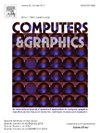用于控制网的窄级联样条
IF 2.8
4区 计算机科学
Q2 COMPUTER SCIENCE, SOFTWARE ENGINEERING
引用次数: 0
摘要
四主导网格很受动画设计师的欢迎,可以有效地从点云生成。为了连接初级区域,四主导网格包括非四价顶点和非四元区域。为了在丰富细节和简单形状的区域之间转换,四主导网格通常使用n−1个三角形的级联,将平行四条带的数量从n+1减少到2。对于这些级联,窄级联样条(简称NCn)提供了一个新的形状优化的G1样条表面。神经网络可以将级联网格视为类b样条控制网。对于n>;3,与n=2,3相反,级联具有内部点,这些点既指导又使输出张量积NCspline的构造复杂化。NCn样条遵循输入网格,包括内部点,并提供低度的高质量曲面。本文章由计算机程序翻译,如有差异,请以英文原文为准。

Narrowing-Cascade splines for control nets that shed mesh lines
Quad-dominant meshes are popular with animation designers and can efficiently be generated from point clouds. To join primary regions, quad-dominant meshes include non-4-valent vertices and non-quad regions. To transition between regions of rich detail and simple shape, quad-dominant meshes commonly use a cascade of triangles that reduce the number of parallel quad strips from to 2. For these cascades, the Narrowing-Cascade spline, short NC, provides a new shape-optimized spline surface. NC can treat cascade meshes as B-spline-like control nets. For , as opposed to , cascades have interior points that both guide and complicate the construction of the output tensor-product NCspline. The NC spline follows the input mesh, including interior points, and delivers a high-quality curved surface of low degree.
求助全文
通过发布文献求助,成功后即可免费获取论文全文。
去求助
来源期刊

Computers & Graphics-Uk
工程技术-计算机:软件工程
CiteScore
5.30
自引率
12.00%
发文量
173
审稿时长
38 days
期刊介绍:
Computers & Graphics is dedicated to disseminate information on research and applications of computer graphics (CG) techniques. The journal encourages articles on:
1. Research and applications of interactive computer graphics. We are particularly interested in novel interaction techniques and applications of CG to problem domains.
2. State-of-the-art papers on late-breaking, cutting-edge research on CG.
3. Information on innovative uses of graphics principles and technologies.
4. Tutorial papers on both teaching CG principles and innovative uses of CG in education.
 求助内容:
求助内容: 应助结果提醒方式:
应助结果提醒方式:


